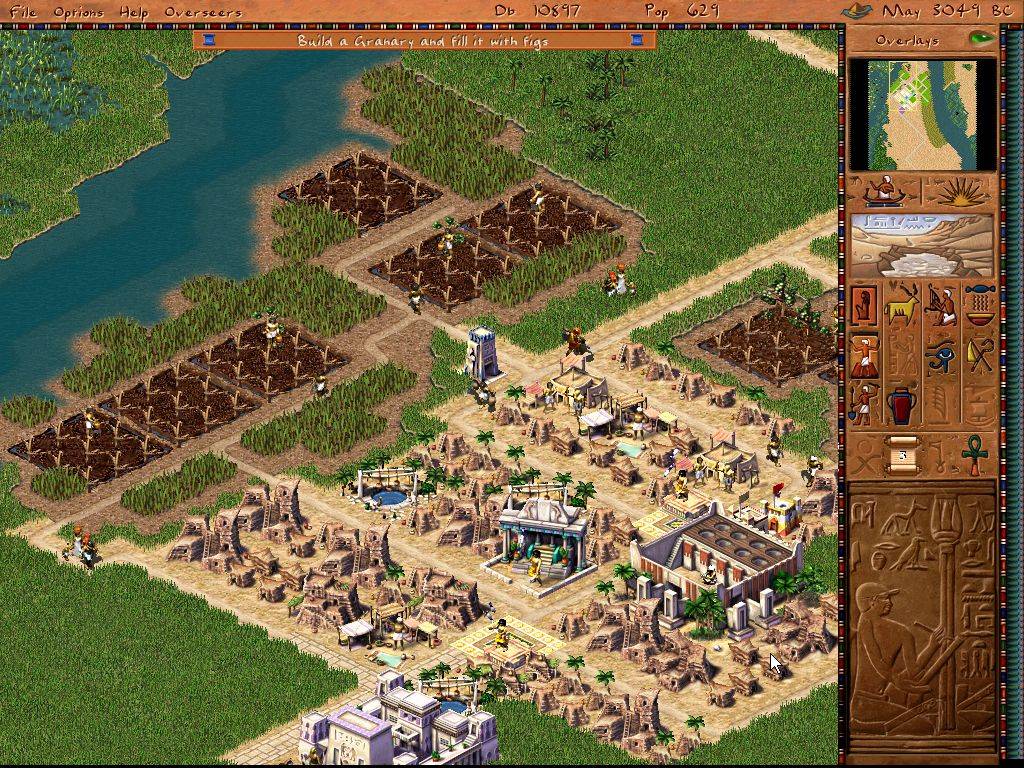

From there, reeds are transported to the papyrus workers to hammer into papyrus. Reeds are harvested from the marsh and transported by the laborers back to the reed shack. This sounds reasonable, but problems soon arise that threaten the very foundation of your great city. Fortunately, every aspect of the game is fairly logical and predictable, which makes the various game flaws a bit more palatable. Any breakdown in the supply chain creates waves that ripple through your economy, wreaking havoc with unintended consequences. The invisible hand of the economy at work! Most goods are delivered through the same mechanism. Citizens then visit the bazaar to purchase grain. From there it is shipped to the local residential districts via couriers, who deposit the goods at a bazaar. Grain is harvested from the fields and shipped to the granary for temporary storage. Most of your time will be spent moving scarce resources to meet unquenchable demand.

If you don't deal with the angry gods immediately, your city could easily regress ten years. Your entire fortune can turn on a single dialog box warning you of a bad year for the floods or an angry local deity. Still, you can't play this game on autopilot. Though the actual mechanics of the game are never revealed, your advisors are quite capable of telling you almost everything you need to know. To help the player with this daunting task, an array of advisors has been assembled to distill the most important information into easily digestible chunks. This mechanistic game keeps you on your toes and requires the player to keep a watchful eye on even the smallest details. Sanitation services require access to water, which increases the demand for labor (you're not actually going to carry that water yourself are you?) The Clockwork Pyramid New housing means new sanitation facilities, lest the plague creep into your shanty towns. If your citizens need more places of worship, you must also plan on adding new housing to accommodate the priests. The entire city building experience is tightly interwoven, so that demands for one good or service ripple through the city and economy affecting every other good or service. Your ability to deliver these city services (such as places of worship, fire and police protection, entertainment, food and drink, and other quality of life necessities) determines your failure or success in this game. As the city develops, citizens will demand more city services. As such, you will find that everything, from building farms to religious ceremonies, revolves around the mighty Nile river and it's flooding season. Egyptian society was dependent on the Nile's yearly floods for all agriculture. By building homes, religious structures and business infrastructure, a player develops a small village into a sizable town.Ĭhallenges particular to Egypt help to engage and immerse the player in this rich environment. Players begin the game with a blank slate - in this case, a nice swath of land situated on the Nile. Early missions serve mainly to introduce the player to the interface and basic game mechanics without overwhelming the novice with too much complexity. Pharaoh follows the familiar metaphor of empire building, though unlike SimCity and Civilization, the game is divided into several distinct missions. Pharaoh comes as the latest in a long line of "God" games - games that place you in control of a city or civilization. If you haven't played Caesar III, read on for the details. If you were put off with some of the odd and difficult glitches of Caesar III, you will find them here as well. If you loved Caesar III, you will probably enjoy this game. Pharaoh is not much more than an expansion of Caesar III. If you already own Caesar III and simply want the skinny on this game, I'll make my concluding argument now. But should you expect more from Pharaoh? Should you expect more from this review? Yes, in both cases. That's not necessarily a bad thing - the GDR awarded Caesar III the "Highly Recommended" designation.

Both Caesar III and Pharaoh were created by Impressions Games, and both utilize the same game design. Simply read our two Caesar III reviews and substitute the word "Egypt" for "Rome" and "Pharaoh" for "Caesar." That's a pretty fair assessment of this game. This could easily be the shortest review I've ever written.
Pharaoh cleopatra game some jobs not filled full#
Read Full Review Give Me a "C-A-E-S-A-R" - What Do You Have? PHARAOH!


 0 kommentar(er)
0 kommentar(er)
